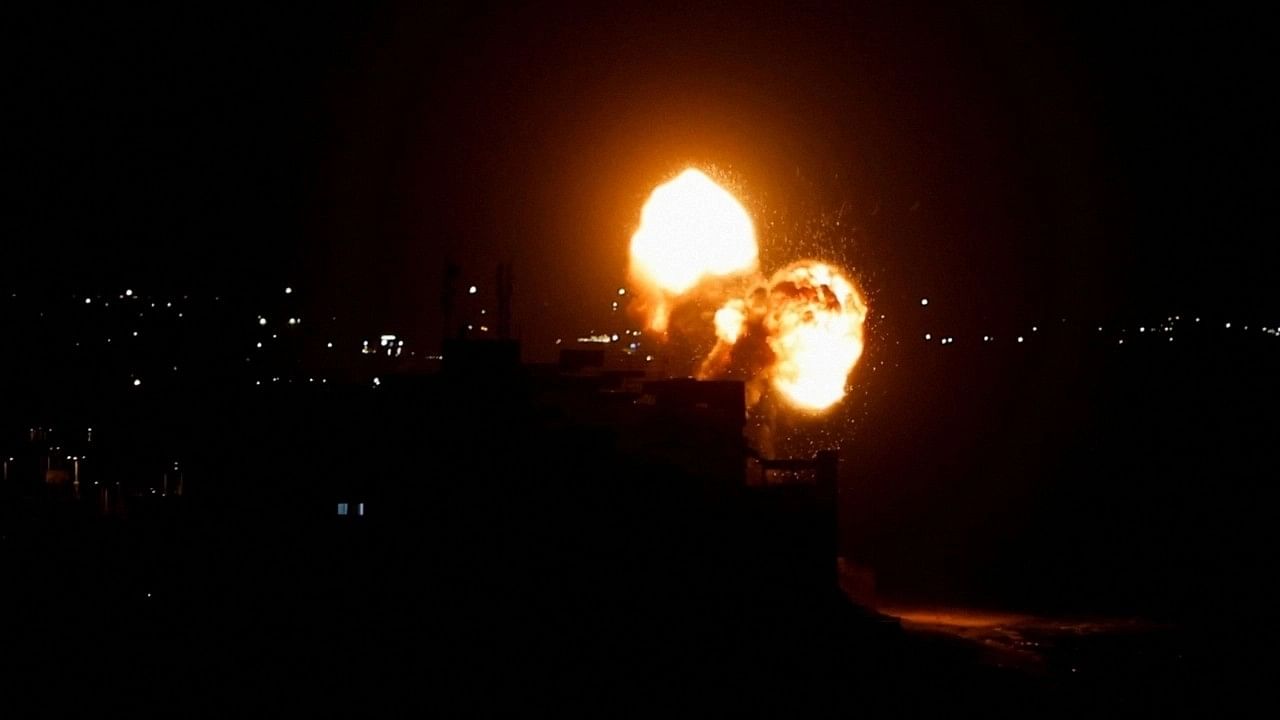
Smoke and flames rise during Israeli airstrikes in Gaza City.
Credit: Reuters File Photo
Two senior United Nations officials described civilian suffering in the Gaza Strip in stark terms at the Security Council on Monday, making urgent appeals for a humanitarian cease-fire in Israel’s war with Hamas hours after that country’s leader, Benjamin Netanyahu, forcefully rejected any such possibility.
“The scale of the horror people are experiencing in Gaza is really hard to convey,” Martin Griffiths, the UN’s chief official for humanitarian and relief affairs, said in a statement delivered on his behalf while he remained in the Middle East.
“The health care system is in tatters,” he said. “Patients lie on the floors and in corridors. Surgeons are operating without anesthesia.” Israeli airstrikes have killed thousands and injured tens of thousands, he said. Some 1.4 million of the territory’s more than 2 million residents are displaced, and hundreds of thousands are packing into overcrowded shelters and seeking protection at hospitals already overwhelmed with patients and under Israeli directives to leave, he added.
“There is nowhere safe for these patients to go,” Griffiths said. “For those on life support and babies in incubators, moving would almost certainly be a death sentence.”
Philippe Lazzarini, the commissioner general for United Nations Relief and Works Agency, the agency that aids Palestinians, appearing via livestream, expressed deep concern for UN workers’ safety. The agency says more than 60 of its personnel have been killed. Lazzarini called his colleagues and the aid they administered “the only glimmer of hope for the entire Gaza Strip.”
But, he said, referring to a border crossing with Egypt, “The handful of convoys being allowed through Rafah is nothing compared to the needs of over 2 million people trapped in Gaza.” He said that without the “political will to make the flow of supplies meaningful,” his agency was doomed to fail.
Netanyahu ruled out any cease-fire at a rare news briefing in Tel Aviv on Monday. He insisted that a halt in Israel’s assault on Gaza would strengthen Hamas, the group that controls the territory and led the Oct 7 attacks on Israel that left more than 1,400 people dead, with more than 200 taken as hostages.
Netanyahu dismissed accusations that Israel’s siege of Gaza — which includes not only the military offensive, but also a cutoff of electricity, fuel and most food and water supplies — was inflicting collective punishment on the civilian population. He cited Israeli directives for people to move to southern Gaza, saying, “We’re going out of our way to prevent civilian casualties.”
The U.N. has said that 100 trucks a day are needed to meet humanitarian needs in Gaza. Far fewer have entered the territory, despite commitments by Israel to let in a larger number. A spokesperson for UNRWA said that 27 trucks of aid had entered Monday morning, and that 39 more were received at dusk and would formally enter Gaza on Tuesday. Meanwhile, airstrikes are continuing, increasing the load on overstrained hospitals.
“People are becoming increasingly desperate, as they search for food, water and shelter amid the relentless bombing campaign that is wiping out whole families and entire neighborhoods,” Griffiths said.
Griffiths and Lazzarini also highlighted surging violence in the West Bank, where at least 115 Palestinians have been killed in confrontations with Israeli settlers, police officers and military forces since the Oct. 7 attack — the highest number of fatalities in a year since the UN began keeping records in 2005.
“The atrocities of Hamas do not absolve the state of Israel from its obligations under international humanitarian law,” Lazzarini said, calling adherence to those obligations essential to limiting spillover of the conflict beyond Gaza.